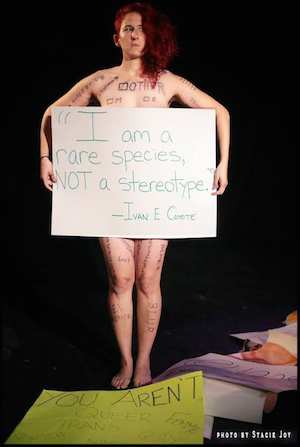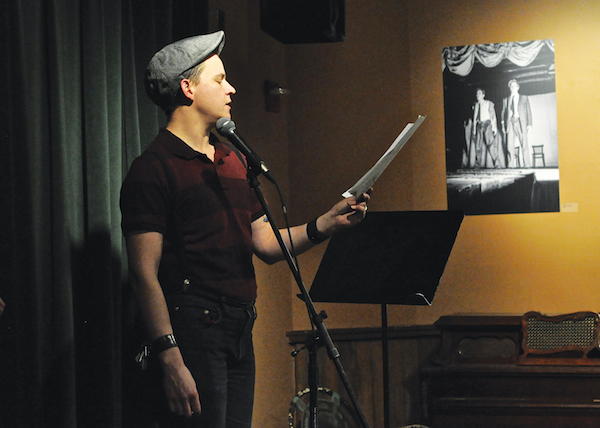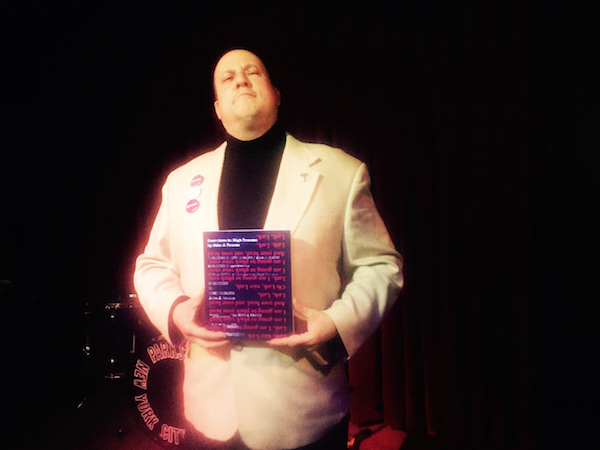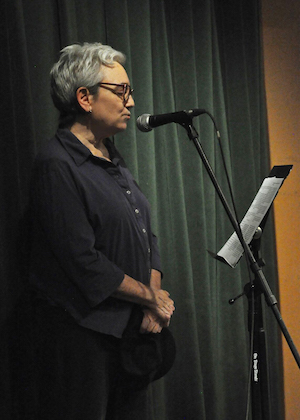
BY PUMA PERL | Aimee Herman, a performance poet, writer, and educator, is very clear about her reasons for founding Queer Art Organics, a monthly series held at Dixon Place.
“I wanted to create a space specifically for LGBTQ writers and performers, and to celebrate the immense range of talent in this city,” she told me. “We’ve had new writers and established ones as well. I wanted this series to be less about one’s bio and more about having an encouraging space to share work with a welcoming audience. I started going to open mics at age 18, and I still remember how it felt to be given three minutes to untangle my soul onstage.”
As host and curator, she selects people she’s seen perform, but also responds to queries from people wanting to be featured, and to recommendations by friends and participants. Some of the artists are as new to her as they are to the audience. “Amazingly,” she told me, “I have never been disappointed.”
The stripped-down, one-hour show, which Herman calls “a beautiful teaser of infinite talent,” consists of three or four performers, and does not limit itself to poets. Storytellers, comics, musicians, and performance artists of all kinds — including belly dancers and sword balancers — have been featured. My recent visit to the series demonstrated Herman’s success in presenting performers who vary widely in their experience. One of the artists, Charlotte Marchand, was reading in public for the first time. She enjoyed great support from the friends she had brought along and from the listeners, as she read excerpts from letters written by her late father. The prose piece was titled, appropriately, “Coming Out to My Dead Father,” and referenced the author’s experience in the women’s movement of the late ’60s and with the Weatherman, two topics that don’t often arise at readings.
Trae Durica, another of the night’s features, describes himself as “genderqueer masculine.” Although he’s had some experience reading in public, Durica said he still feels like “a ball of anxiety and introversion wherever I read. But I do like reading in a queer, safe space, since I often write about my big queer life. I feel so much support in these spaces, where my story resonates with many others.”

Accompanied by Herman on ukulele for the first few poems, Durica’s reading included work from his 2014 chapbook, “Cacophony Worth Remembering.” I was particularly moved by one of what he calls his “Decisions” pieces, in which he asked the questions “normal” people never get asked. “When did you decide you were straight?” it began. “When did you decide you were the same gender as what’s on your birth certificate? When did you decide to wear clothes that make you look straight?”
“I feel that we need to keep creating these queer spaces where it’s safe for us to tell our stories for as long as it’s unsafe to be queer anywhere in the United States,” he said. “But at the end of the day, I want to read in any space where people are paying attention to performers instead of their cellphones.”
The third feature of the evening, John J. Trause, opened his set by announcing, in a deadpan tone, that he wished to pay homage to Sappho — then, in a hilarious high-pitched voice, recited one of her poems in the original ancient Greek Aeolic dialect.
“I’m a performance poet,” Trause told me, “but I hate being labeled that way. I am also a visual poet, a conceptual poet, a metrical poet, a spiritual poet.” Trause is the Director of New Jersey’s Oradell Public Library and his list of writing credits and published books is long. On this evening, he read some pieces from his brand new book, “Exercises in High Treason,” (great weather for MEDIA, 2016). He describes it as “a work of fictive translations, found poems, and manipulated texts.”

In keeping with his self-description, the book is playfully arranged with a highly visual and conceptual appeal. “Even though I am a writer and librarian,” he said, “I love to reveal how words betray us. Since I have some real and some fake translation in my book, as well as other verbal transformations, I am committing high treason.”
Queer Art Organics started at Brooklyn’s Branded Saloon in October of 2014, and moved to Dixon Place in February of 2015. “Dixon Place, which is all-encompassing, is my favorite New York City venue,” Herman declared, “because of its resiliency and incredible support to the queer community and to artists in general. I love that they offer free and low-cost shows.”

This summer, the HOT! Festival, which is the world’s longest-running LGBTQ festival, returns to Dixon Place — and Herman is thrilled to have the series included in it. As usual, Queer Art Organics will offer what she describes as “a myriad of language.”
“I want to continue to be inclusive and never feel elite in any way,” Herman said. “Any queer humans out there reading this who would like to perform are welcome to contact me by email: aimeeherman@gmail.com. Sometimes the very best are the ones who’ve never taken the stage before. That’s so often when the magic happens.”
Queer Art Organics is held at Dixon Place (161A Chrystie St., btw. Rivington & Delancey Sts.), usually on the second Wed. of every month. It is a free one-hour event and starts at 7:30pm. The next show is Tues., July 19, as part of the HOT! Festival (which runs July 5–Aug. 6). The series skips Aug. and returns in Sept. For more info, visit dixonplace.org. Recent work by Aimee Herman and John J. Trause can be purchased at greatweatherformedia.com.
































